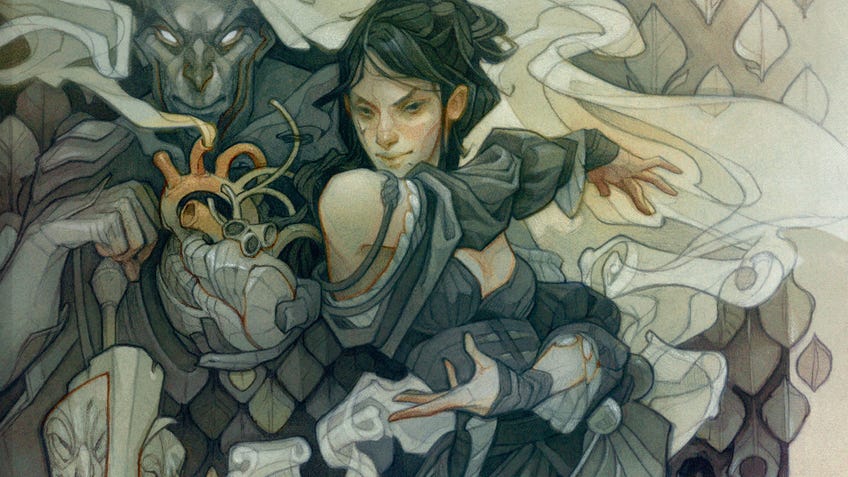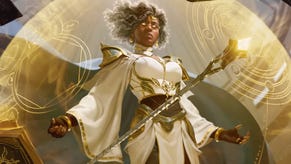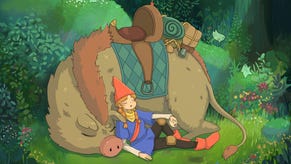Dungeons & Dragons’ first attempt to address RPG’s race problems disappoints its community
More like Rule Zero Effort.
Dungeons & Dragons 5E sourcebook Tasha’s Cauldron of Everything released on November 17th, and the community has been digesting the new errata, class options and worldbuilding tools for a week. Importantly, the supplement contains Wizards of the Coast’s first official attempt at addressing race in the tabletop RPG since a letter in June outlining its planned steps for improvement.
But fans have been disappointed to find that the section detailing race covers less than two pages and describes changes to backgrounds during character creation. Ability scores normally tied to race, such as dwarves possessing an innate +2 to their constitution scores, can be ignored in favour of a “custom lineage” option that unlocks racial restrictions on bonuses, skills and proficiencies.
Bruce Boville wrote on But Why Tho? that amending backgrounds only affects the player character and swerves on addressing the depiction of that character’s society and culture, or that of other members with different lived experiences. “Instead of trying to move away from harmful Black stereotypes for orcs, the book shrugs and says, ‘Maybe your character isn’t a stupid brute with anger issues, but most orcs still are,”’ Boville said.
Some tabletop players have chafed at what they viewed as an assumption on Wizards’ part that as long as their personal character isn’t a racist caricature, the problem has been solved. But this exceptionalism whiffs on the much larger issue of systemic depictions.
“These options allow you to make ‘the good drow’ or ‘the smart orc.’ You get to play as the exception to the bio-essentialist rule that all dark-skinned elves are evil, that those savage orcs are stupid and violent,” Arcanist Press said on Twitter.
Others derided the inclusion for not enforcing a hard line against players who would revel in, or explicitly excuse, racist stereotypes in D&D’s many societies and cultures. Wizards previously mentioned how Curse of Strahd’s Vistani “echoes some stereotypes associated with the Romani people in the real world” as an instance it would amend in later printings. Curse of Strahd Revamped made good on that promise. Twitter user kai_tave argued the solution in Cauldron of Everything wasn’t even new but hearkened back to one of the first printed products.
“It absolutely owns that Wizards of the Coast, facing a year of public fuckup after public fuckup, decide that the best way to address peoples' criticisms and win back their favor is to go back to the heady days of 2001 and reinvent Rule Zero all over again,” kai_tave wrote on Twitter.
Rule Zero is a common concept first expressed in the first edition of D&D written by Gary Gygax and Dave Arneson. They admit that rules should bend or shift - or be ignored completely - in order to best keep play running smoothly for all involved. The popular interpretation of “The DM is always right” stems from D&D 3E’s edict that house rules fall to the discretion of whoever runs the table.

Kai_tave’s criticisms of Rule Zero echo a common sentiment that empowering DMs to decide whether or not something in the game is racist - and therefore grounds for change - passes the buck instead of taking a hard stance against the barriers that keep BIPoC players feeling unsafe and unheard at the table.
“[W]hat this release told me, and likely tells many others, is that Wizards is still not serious about dealing with the racism and bioessentialism in their books and game. It told me that they’re entirely happy with the status quo, and that their promises of change, diversity, and inclusion are as hollow as they were revealed to be this summer, and that their apology was empty,” Graeme Barber said in a recent blog. “Where it could have started meaningful change, instead it offers the most superficial of change to the point where it’s not actually worth the money it cost to print the page it's on.”
Dicebreaker reached out to Wizards of the Coast for comment, but did not receive a reply by time of publication.
Edit: This article has been updated to clarify Graeme Barber's comment about Wizards of the Coast.









